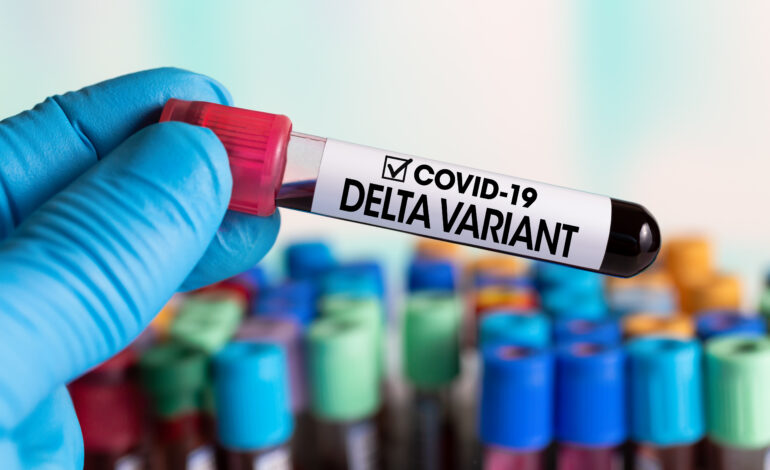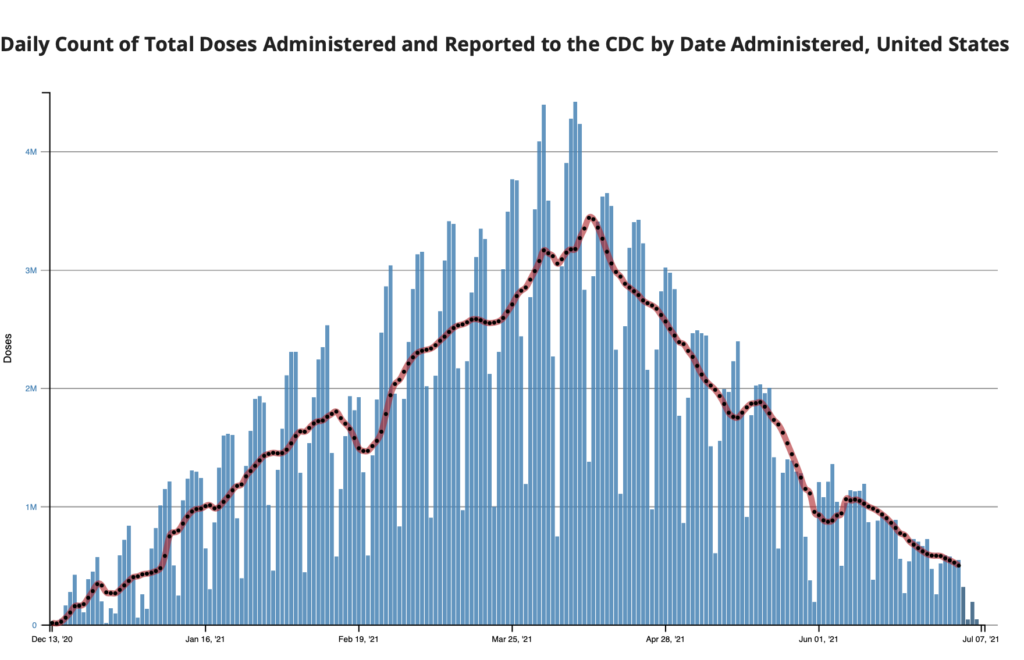With the more-infectious Delta variant emerging as the most common strain of the coronavirus, parts of the U.S. with the lowest vaccination rates are threatening to halt progress on the pandemic in the country.
Southern states like Arkansas, Missouri and Alabama have some of the lowest vaccination rates in the country, according to U.S. Centers for Disease Control and Prevention (CDC). The CDC also notes that case rates are an average of three times higher in states that have vaccinated a smaller share of their residents.
With COVID-19 rates spiking to dangerous levels in states like Missouri, experts are now afraid those areas can become likely breeding grounds for more variants. Others are afraid Delta’s spread will make it harder for the country to reach herd immunity.
“And any time you have large outbreaks, it does become a breeding ground for potentially more variants,” Dr. Ashish Jha, dean of the Brown University School of Public Health, told CNN this week.
We’ve been lucky with the variants so far that they’ve been relatively susceptible to our vaccine, but the more you roll the dice, the more opportunities there will be for a resistant variant – Dr. Jonathan Reiner, George Washington University
Though latest vaccines have shown good protection against new variants, including Delta, experts are fearful that the next variant might be better at outsmarting the vaccine, causing problems even for parts of the country that have high vaccination rates.
“We’ve been lucky with the variants so far that they’ve been relatively susceptible to our vaccine, but the more you roll the dice, the more opportunities there will be for a resistant variant,” said Dr. Jonathan Reiner, a CNN medical analyst and professor of medicine and surgery at George Washington University on Thursday.
Reports of one Missouri hospital came out this week showing it to be under such strain with cases that COVID-19 patients were being transferred to hospitals in different health systems.
The rise in the Delta variant has sparked health experts to warn Americans to remain cautious, even though their state and federal government have virtually abandoned mask wearing and social distancing requirements.
“If I were in southwest Missouri right now, I’m fully vaccinated but I would be wearing a mask indoors,” Jha said.
The variant was originally detected in India, where it wreaked havoc on the country’s population. It is now the most prevalent lineage of the virus in the U.S and could is on track to make up half or more of infections by early to mid-July.
In Michigan, the percentage of vaccines administered puts it in the lower third of states. Only some 52 percent of the state’s population has been fully vaccinated. The numbers reflect overall vaccinations in the country at-large, where only about 47 percent of the population has been fully vaccinated, according to the CDC.
Vaccination rates have declined overall in the U.S. since reaching peaks in late winter and this spring.
Experts, like the county’s top infectious disease expert Dr. Anthony Fauci, have proclaimed that 70 to 85 percent of the country’s population needs to be inoculated to win the emerging battle against the variant, and the pandemic overall.
The Delta variant became the dominant strain in the UK, a country that was a step ahead in vaccinations compared to the U.S. and where cases previously fell faster. The variant caused cases to double in the European country in June.
Although the Pfizer, Moderna and Johnson & Johnson have said their studies show good protection against all prevailing COVID-19 strains, experts say people living in low-vaccinated, high-transmission areas should continue to wear masks.
But Pfizer said on Thursday that it will ask the U.S. government for the approval of a booster dose of its COVID-19 vaccine within the next month.
Delta in Michigan
Prompted by concerns over the variant, the World Health Organization (WHO) last week urged even fully vaccinated people to continue wearing masks and taking other precautions. But the CDC, on the other hand, has maintained its virtually relaxed guidance for fully vaccinated Americans since May that they no longer needed to wear masks indoors or to stay six feet from other people. The agency also eased advice about testing and quarantine after suspected exposure.
Spikes in COVID-19 cases have historically put a strain on healthcare facilities and supplies. This potential led a Michigan medical ethics professor to pen an op-ed in Bridge Magazine, where he said vaccine refusers should be last in line for limited medical resources.
“By now almost every adult in Michigan has had some opportunity to get the vaccine,” wrote Parker Crutchfield, associate professor of medical ethics, humanities and law at Western Michigan University. “Those adults who have had access to the vaccine but have willingly refused it should be our last priority in allocating limited medical resources.”
Doctors say adults should be cautious for their children during such a time and continue to use precautions for children who aren’t able to receive a vaccine yet. This includes masking children indoors, especially around unvaccinated adults from outside a child’s household. Parents are urged to keep an eye on case rates in their local areas.
Children under the age of 12 are not yet approved for a COVID-19 shot in the U.S.
“We haven’t formally proven yet how much diminution there is in the likelihood of transmitting it to someone else — including children — and that’s one of the reasons why you’ve got to be careful when you’re dealing with something like the Delta variant,” Fauci said of the potential of adults, vaccinated or not, to pass the disease to children.
MDHHS recommends that individuals continue to wear face masks in certain situations, including in classrooms. Because many students are not yet fully vaccinated, schools and childcare providers should continue to follow the COVID-19 prevention strategies… – Chelsea Wuth, MDHHS
The Arab American News asked the Michigan Department of Health and Human Services MDHHS questions about the growing threat of the Delta variant in Michigan. The following answers were received on Thursday, July 8, and are attributed to Chelsea Wuth, Associate Public Information Officer at MDHHS:
- With the Delta variant becoming the most common source of COVID-19 infections in the country, have health authorities in Michigan noted a dramatic rise in cases involving Delta as well? Has the state recorded cases of the Delta variant in people already vaccinated (breakthrough cases)?
At this time, there are 53 Delta cases that have been sequenced in 16 jurisdictions in Michigan. This includes 11 cases from people outside of Michigan who were tested in our state. There have been 4 breakthrough cases with the Delta variants out of 7,447 breakthrough cases.
- Michigan has made great strides in vaccinations but rates have slowed down over time. Is there cause for concern that a segment of the population remains unwilling to take a vaccine and thus slow down the progress towards herd immunity before further mutations lead to more infectious strains? Could future outbreaks potentially lead to further state shutdowns?
We continue to urge all eligible Michiganders to get the safe and effective COVID-19 vaccine as soon as they are able as the vaccine is our best defense against the virus. To locate a vaccine, visit VaccineFinder.org.
- Will MDHHS require continued masking in school systems, where children under 12 years of age are not yet able to receive a COVID-19 vaccine?
There is no longer a statewide requirement to wear a face mask in most settings; however, local health departments, establishments, sports organizers, and school districts may have additional rules that must be followed. MDHHS recommends that individuals continue to wear face masks in certain situations, including in classrooms. Because many students are not yet fully vaccinated, schools and childcare providers should continue to follow the COVID-19 prevention strategies outlined in the current version of the CDC’s Operational Strategy for K-12 Schools for at least the remainder of the 2020-2021 academic school year and summer school, including masking when indoors.







Leave a Reply